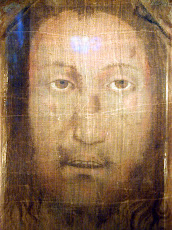Friday, February 21, 2014
His Gaze Heals Us
by Fr. Daren J. Zehnle, K.H.S.
from his blog "Servant and Steward" http://dzehnle.blogspot.it/2014/02/his-gaze-heals-us.html
February 16, 2014
"The eyes of God are on those who fear him," a sage of Israel today reminds us, and "he understands man's every deed" (Sirach 15:19). Having seen the eyes of God in the image of the Holy Face enshrined at Manoppello, this verse has taken on a great depth of meaning.
Most regrettably, the fear of the Lord has been, if you will, watered down in recent decades and all but written off as unnecessary or even unwarranted. But, since "the fear of the LORD is the beginning of wisdom," this cannot be true (Psalm 111:10).
No, possessing a fear of the Lord is good, holy, and proper, but an authentic fear of the Lord does not lead to grovelling or cringing before the Lord who looks upon us with compassion (cf. Matthew 9:36; Mark 10:21; Luke 10:33). Because he knows our deeds, he looks upon us with compassion. As the author of the Epistle to the Hebrews reminds us: "For we have not a high priest who is unable to sympathize with our weaknesses, but one who in every way has been tempted as we are, yet without sinning. Let us then with confidence draw near the throne of grace, that we may receive mercy and find grace to help in time of need" (Hebrews 4:15-16).
Speaking to our concerns about our need for a correct understanding of the fear of the Lord - of which the Sacred Scriptures so frequently speak - His Holiness Benedict XVI once noted:
Perhaps this is a phrase with which we are not very familiar or do not like very much. But "fear of God" is not anguish; it is something quite different. As children, we are not anxious about the Father but we have fear of God, the concern not to destroy the love on which our life is based.
Fear of God is that sense of responsibility that we are bound to possess, responsibility for the portion of the world that has been entrusted to us in our lives. It is responsibility for the good administration of this portion of the world and of history, and one thus helps the just building of the world, contributing to the victory of goodness and peace.
None of us wants to waste our lives or to disappoint those who love us and whom we also love. We might well say if we have the fear of disappointing him who died for us we have the fear of the Lord, a fear based not on grovelling but on love. Because he knows our deeds and looks on us with love and compassion, we feel all the more intently, when we look into his eyes, our lack of love of him and of our neighbor.
When we consider his eyes or his face, how can we not remember the look he gave to Simon Peter (cf. Luke 22:61-62)? What did Peter see in those eyes? He saw what everyone sees who fears the Lord, what Benedict XVI described in his encyclical Spe salvi:
The encounter with him is the decisive act of judgement. Before his gaze all falsehood melts away. This encounter with him, as it burns us, transforms and frees us, allowing us to become truly ourselves. All that we build during our lives can prove to be mere straw, pure bluster, and it collapses. Yet in the pain of this encounter, when the impurity and sickness of our lives become evident to us, there lies salvation. His gaze, the touch of his heart heals us through an undeniably painful transformation “as through fire”. But it is a blessed pain, in which the holy power of his love sears through us like a flame, enabling us to become totally ourselves and thus totally of God. In this way the inter-relation between justice and grace also becomes clear: the way we live our lives is not immaterial, but our defilement does not stain us for ever if we have at least continued to reach out towards Christ, towards truth and towards love. Indeed, it has already been burned away through Christ's Passion. At the moment of judgement we experience and we absorb the overwhelming power of his love over all the evil in the world and in ourselves. The pain of love becomes our salvation and our joy.
Looking upon the veil that once covered the face of the Crucified Lord and was found in the empty tomb, one sense this moment, this encounter, has begun. On that veil it is possible to look upon his face, to gaze into his eyes, the eyes of the Living Lord. In that gaze is love, mercy, and understanding.
photos by Paul Badde
Subscribe to:
Post Comments (Atom)
.JPG)
.JPG)
.JPG)






No comments:
Post a Comment